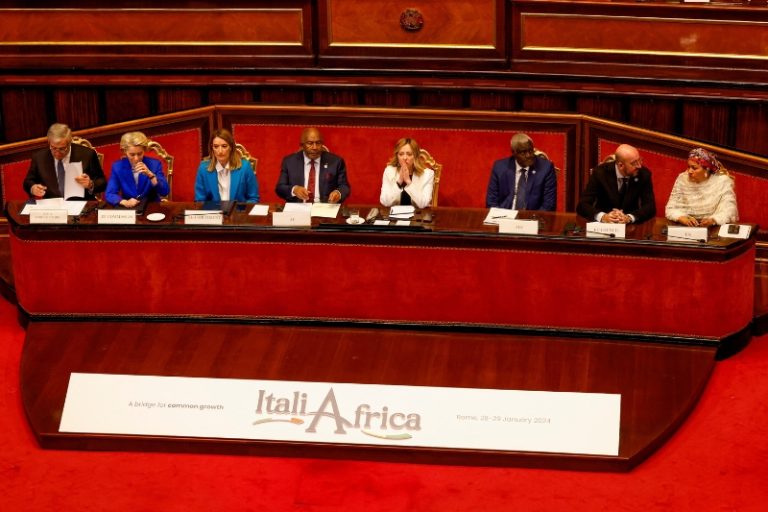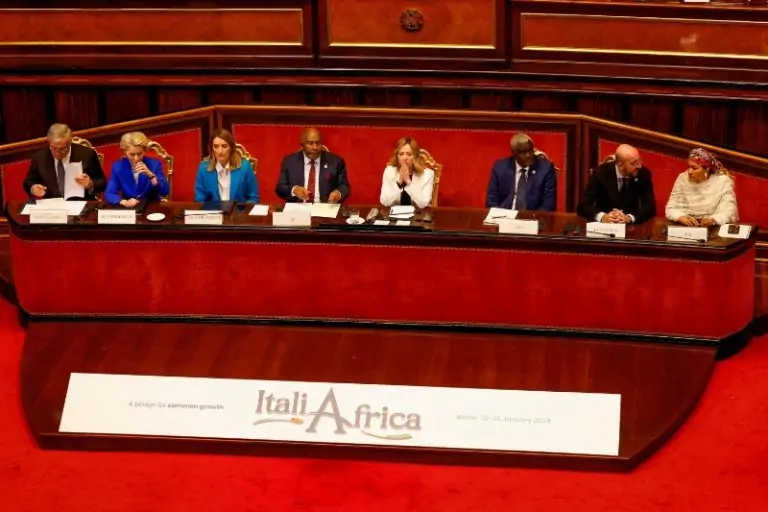

italy courts africa with new development plan the mattei plan seeks peer to peer growth
On Monday, a pivotal summit brought together African leaders, Italian Prime Minister Giorgia Meloni, and representatives from international institutions and the EU. This gathering marked a significant push for a fresh approach to Africa’s development, one that aims for collaborative growth rather than historical power imbalances.
“Our objective is to present our vision of African development,” declared Meloni in a pre-summit interview. This vision, she emphasised, eschews the pitfalls of past approaches. Gone are the days of “predatory and paternalistic” partnerships. Instead, Meloni proposes a “peer-to-peer” relationship, fostering shared progress and mutual benefit.
This novel strategy, dubbed the Mattei Plan, draws inspiration from Enrico Mattei, the visionary leader of Italy’s state-owned oil giant Eni. The plan prioritizes tangible interventions in crucial sectors like education, healthcare, water and sanitation, agriculture, and infrastructure development. These investments aim to address fundamental needs and empower African communities to thrive.
While details remain in flux, initial reports suggest pilot projects will prioritize education and healthcare initiatives. Equipping future generations with knowledge and improving health outcomes are pivotal for long-term prosperity. Additionally, bolstering infrastructure like irrigation systems and renewable energy solutions is crucial for boosting agricultural productivity and promoting sustainable development.
Meloni’s vision is not solely economic. It acknowledges the complex interplay between poverty and migration, particularly with Italy bearing the brunt of perilous Mediterranean crossings undertaken by Africans seeking a better life. The Mattei Plan, by fostering economic opportunities and improving living standards, hopes to offer viable alternatives to these desperate journeys. By building a more prosperous Africa, the plan indirectly addresses the migration issue, fostering growth and stability at its root.
Naturally, scepticism lingers. Criticisms surrounding the initiative’s feasibility and long-term commitment point to the hefty price tag of such extensive development projects. Moreover, concerns regarding transparency and accountability in resource allocation require careful consideration.
However, the summit’s very occurrence signifies a renewed interest in a genuine partnership. Whether the Mattei Plan fulfils its ambitious goals or not, its commitment to a mutually beneficial, non-patronizing approach represents a welcome shift in the paradigm of Africa’s development narrative.
The Mattei Plan’s path forward is paved with both promising opportunities and potential roadblocks. While the plan’s focus on human development and infrastructure holds immense potential for positive change, successfully navigating these challenges will be crucial for its long-term success.
One of the Mattei Plan’s most promising aspects is its emphasis on partnership. By actively engaging with African leaders and communities, Italy can ensure that projects are tailored to specific needs and contexts. This collaborative approach fosters local ownership and buy-in, increasing the likelihood of sustainable success.
Furthermore, the peer-to-peer nature of the partnership opens doors for knowledge and technology exchange. Italian expertise in areas like renewable energy and sustainable agriculture can be shared and adapted to benefit African communities. This reciprocal learning environment fosters mutual growth and empowers African nations to chart their own development paths.
The estimated financial commitment of €3 million, while significant, raises concerns about the plan’s long-term sustainability. Critics argue that this sum pales in comparison to the vast resources required for comprehensive development across a continent as diverse as Africa.
To address this concern, Meloni has hinted at the potential for public-private partnerships and leveraging investments from international institutions. Engaging the private sector and harnessing the expertise of development agencies can significantly amplify the plan’s financial muscle. Additionally, prioritising pilot projects in manageable settings will allow for initial successes and attract further investment through demonstrable impact.
History has unfortunately cast a shadow of doubt on foreign development initiatives, often marred by allegations of corruption and mismanagement. To avoid these pitfalls, the Mattei Plan must prioritize transparency and accountability throughout its implementation.
Independent monitoring mechanisms and robust anti-corruption measures are essential to ensure that funds reach their intended recipients and projects are executed effectively. Moreover, regular engagement with local communities and civil society organisations can act as a valuable feedback loop, preventing missteps and ensuring projects align with actual needs.
Achieving sustainable development requires a delicate balancing act. While long-term commitment is crucial to ensure continuity and impact, maintaining flexibility to adapt to evolving circumstances is equally important. The Mattei Plan’s success hinges on its ability to navigate this dynamic.
Regular evaluations and assessments will be vital for identifying successes and challenges, allowing for adjustments and course corrections as needed. Furthermore, fostering an environment of open dialogue and feedback will enable the plan to evolve and respond to changing realities on the ground.
The Mattei Plan, with its emphasis on collaboration, investment in human capital and infrastructure, and a commitment to shared prosperity, offers a refreshing perspective on Africa’s development narrative. While challenges remain, the plan’s potential to foster genuine partnership and empower African communities holds immense promise.
Ultimately, the Mattei Plan is not a silver bullet solution, but rather a stepping stone towards a more sustainable and equitable future for Africa. Its success will depend on Italy’s unwavering commitment, collaborative spirit, and ability to navigate the complex realities of African development. Through transparency, accountability, and continuous adaptation, the Mattei Plan can pave the way for a new era of mutually beneficial partnerships and shared prosperity between Italy and Africa.
The 2025 edition of AFCON will be hosted by Morocco which serves both the high-level competition and as a catalyst…
The Christian community marks Good Friday as its deepest holiday to remember when Jesus died at Calvary. The Christian community…
Art has the potential to take the talents from any regions across the globe, and this world has witnessed one…
Thousand of users worldwide face a discontinuation of WhatsApp services on older Android versions as Meta has officially announced this…
Disaster teams in KwaZulu-Natal stand ready to respond to persistent rainfall while drivers should approach roads with care. According to…
Starlink the satellite internet company by Elon Musk is growing fast in Africa. It now works in more than 20…
This website uses cookies.